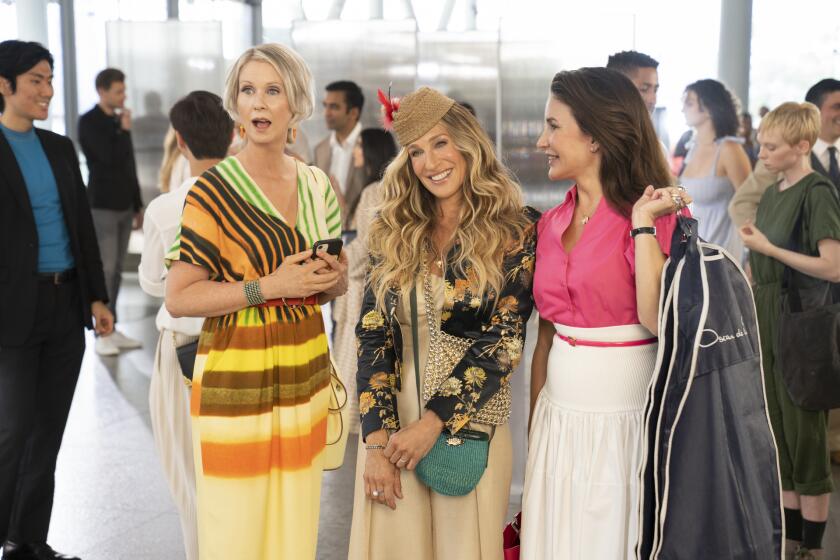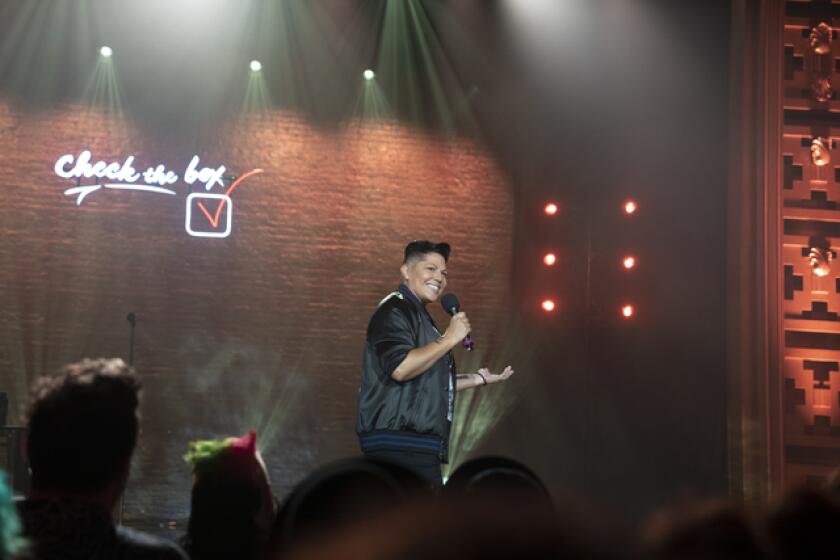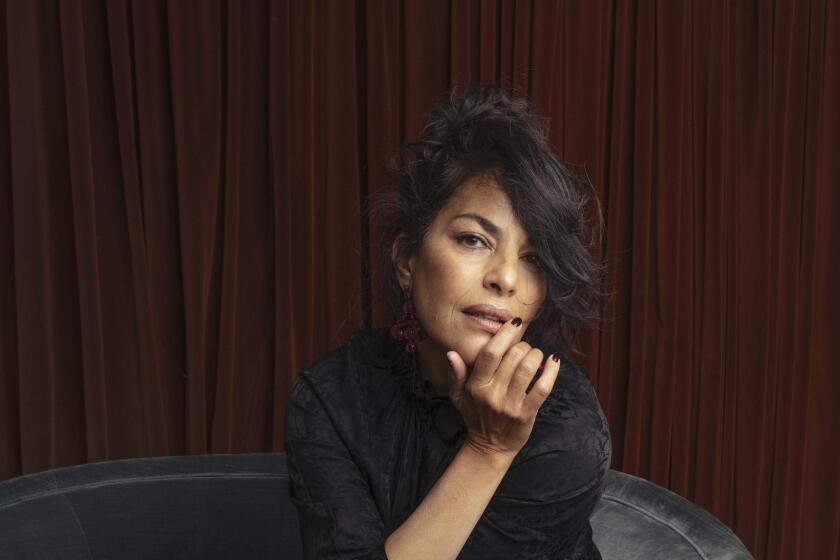‘And Just Like That’ was a train wreck. Here’s what made it unmissable anyway
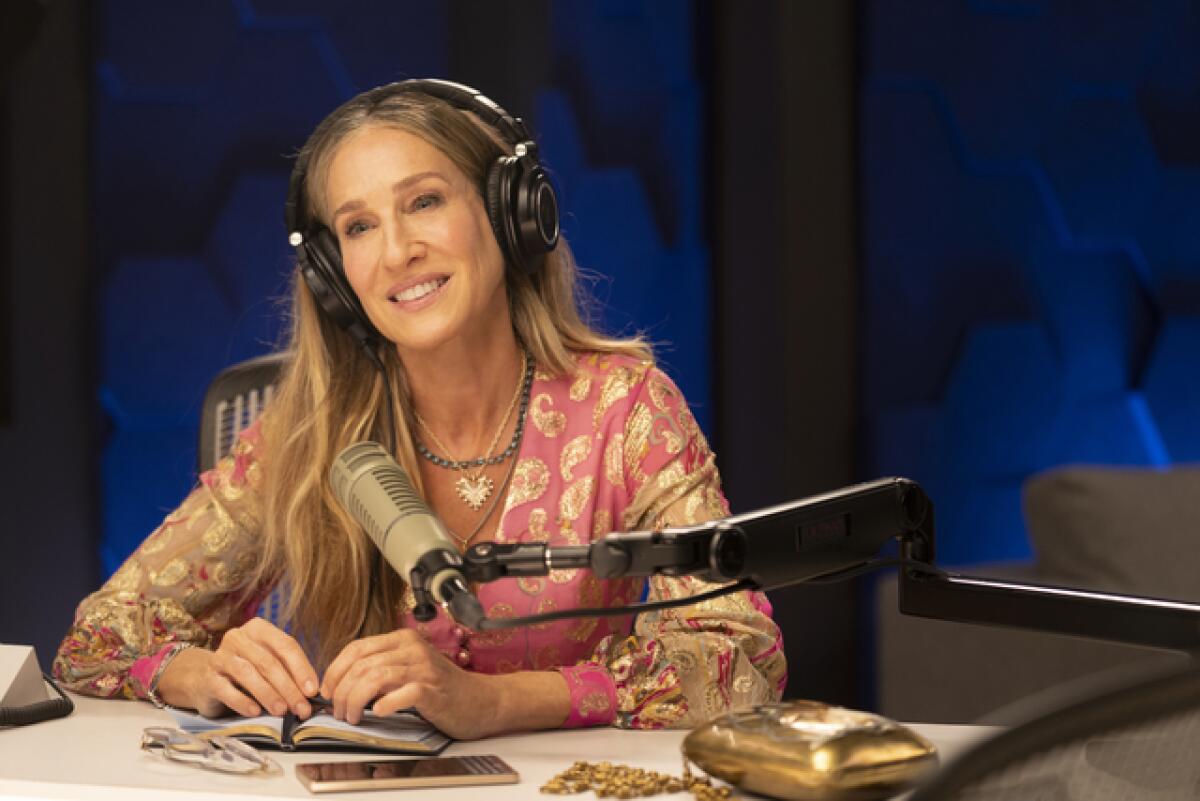
- Share via
This story contains spoilers from the season finale of “And Just Like That...”
After 10 episodes, dozens of brunches, several unannounced visits by Che Diaz and a truly staggering number of ridiculous hats, “And Just Like That...” has come to an end.
And what a wild ride it has been — literally so in the case of Big, who died after exerting himself on the Peloton. From Carrie peeing in a bottle of iced tea to Harry’s prosthetic penis, the show has given us all plenty of moments to talk about. Critics may not have been kind but viewers have flocked to the series in droves, making it HBO Max’s most-watched original to date (whatever that means without actual numbers). Series creator Michael Patrick King and star Sarah Jessica Parker have told Variety they’re open to another season.
The season finale, premiering Thursday, finds Carrie contemplating what to do with Big’s ashes, then traveling to Paris to scatter them on the bridge where he rescued her during a terrible trip many years ago, and moving on with the hunky podcast producer who’s been making eyes at her all season.
Meanwhile, Miranda decides to bail on a high-profile internship to be with Che in L.A. while they make a pilot — hmmm, what could possibly go wrong? — and Charlotte throws Rock a “they-mitzvah” for the ages.
Where did “And Just Like That” go wrong? What made this bonkers revival so compulsively watchable? And just why do some of us care so damn much about these characters? Staff writer Meredith Blake and culture critic Mary McNamara share their theories here.
We break down the good, the bad and the fabulous of HBO Max’s new ‘Sex and the City’ reboot, ‘And Just Like That ...’
Meredith Blake: Mary, as you know, I started out as a defender of this show. I thought the first few episodes, while messy, gave us plenty of promising new territory to explore: grief, aging, the perils of being an affluent, straight white woman in a changing social environment. I loved the insanity of killing off Big via Peloton. I was excited for Carrie to be single and return to the dating world (eventually). I didn’t even mind the lack of Samantha.
But most of all, I felt committed to these characters. I’ve spent more than half my life watching them on TV. It would take a lot more than the horror of watching Big masturbate — ugh, sorry for the reminder — for me to abandon this show completely.
Let’s just say my loyalty has not been rewarded.
Each week, I eagerly tuned in, hoping that things would get better — that Miranda would come to her senses, that Carrie would pick an apartment already, that Steve would find his way around the farmers market. And each week, I would be disappointed.
I found myself more and more frustrated with the underdeveloped characters, the incoherent storytelling, the wild tonal swings from scene to scene, the depictions of podcasting and stand-up comedy that bore no resemblance to either (if I hear the phrase “comedy concert” one more time, I will eat a VHS copy of “Eddie Murphy: Raw”).
Storylines would be introduced only to vanish completely by the next episode. Miranda flew off to Cleveland to surprise Che, a gesture Miranda herself likened to something out of a romantic comedy and one that seemed destined for spectacular failure.
Instead, the show skipped over the whole Cleveland thing completely, forgetting it along with Miranda’s drinking problem, Carrie’s book and whatever the heck was going on with Big’s secretary.
I couldn’t help but wonder … were the writers of these episodes even talking to each other?
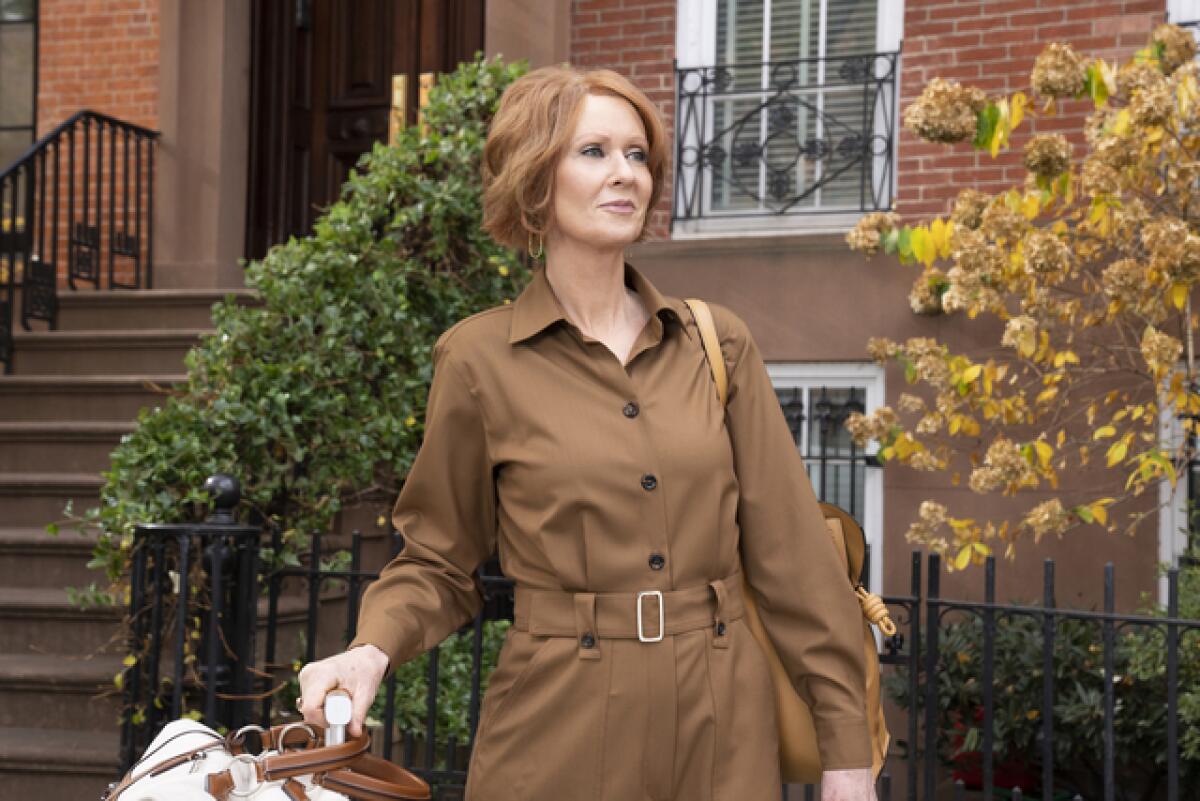
And that brings me to the biggest problem this season: Miranda. My God, what have they done to her?
During the original run of “Sex and the City,” Miranda was a radical character, the prickly one with the sensible wardrobe who didn’t buy into Charlotte’s fairy tales or Carrie’s gauzy fashion fantasies. The show wanted us to think of ourselves as Carries, but most of us were Mirandas at heart.
Now, Miranda is a blubbering, lovesick idiot. The problem is not that she left Steve, or that she fell in love with a queer, nonbinary person — though I think these writers are underestimating the importance of finding someone to watch TV with. It’s that she’s acting like a selfish twit and the show wants us to sit back and shout “Yasss, queen!” as she blows up her life. If I learned one thing from “The Hills,” it’s that you never turn down a coveted internship to go hang out at the beach with your new crush. It won’t end well.
All that being said, I couldn’t wait to watch the screeners as soon as they landed in my inbox each week. For a show I didn’t particularly like, “And Just Like That” has consumed an inordinate amount of my mental energy for the last two months. I’ve discussed it on social media, with other moms at drop-off, and in group chats with friends who, like me, wondered why Charlotte’s daughter had such trouble inserting a tampon and couldn’t wait to see which of Carrie’s exes would show up in a surprise twist (sadly, none of them).
And it wasn’t as simple as hate-watching, where a show is so viscerally awful it feels cathartic to dump on it collectively. It was more like King had taken us all hostage and we’d developed Stockholm syndrome. At some point it became clear that the audience cared more about these characters — and certainly understood them better — than their own creator did.
Now that we’re at the end of the season, I am hoping that this train wreck of a show gets renewed, if only because I cannot accept the idea that Miranda will spend eternity with Che Diaz. (Clearly, I do not have a healthy relationship with this show.)
Mary, what do you think was the biggest problem with “And Just Like That”? Was it Miranda’s brain transplant? The bizarre Peloton obsession? The way they did Steve so dirty? The clumsy attempt to atone for the extreme whiteness of the original series by introducing four new characters of color who were mostly half-baked? Che Diaz?
In Screen Gab No. 20, we explore “And Just Like That’s” most talked-about character, catch up with the author of “Maid” and talk “The Rings of Power.”
Mary McNamara: At the moment, my biggest problem is the full-blown crisis of Che Diaz being in Los Angeles. I repeat: Che Diaz is in Los Angeles. Seriously, if King wants to sully the reputation of New York with his ridiculous antics, fine. But keep it the hell away from L.A.
Though I do feel like Che getting a pilot says a lot about King’s feelings toward television at the moment, which is, apparently, that pretty much anything can get made. “And Just Like That” being a case in point.
As you know, I am on the record as hating the show from the get-go — for more than a few minutes, Carrie, Miranda and Charlotte seemed less like older iterations of themselves than the 100-year-old resurrected witches of “Hocus Pocus”: “Sister, what is this new magic called Instagram?” As someone in the same age, if not income, demographic as the characters, I kept watching in sheer horror. Were there any over-50 female writers on the staff? Did none of the over-50 female cast members protest being portrayed as complete and utter dimwits?
Apparently not.
I don’t think I’ve ever felt a male gaze more than watching these women “struggle” in ways that belie the fact that they have been women alive on this planet, and navigating a major urban center, for half a century. I understand that King is trying to acknowledge the bubbles of privilege he put them in during “Sex and the City,” but “And Just Like That” feels less like a correction than a punishment. As if King were angry at them not only for his mistakes but for not being the young women of the original series. When he had the nerve to put Charlotte in a freaking white coverall so her unexpected period had maximum shock value, I was forced to utter all the swears, none of which fit within The Times’ profanity guidelines.
Though, speaking of that episode, I did actually sympathize with the tampon trouble — I can say from experience that this can be an issue, especially when girls get their periods at 13 or 14 and want to go swimming. And who among us hasn’t “lost” the string?
But one resonant C plot does not make up for all the other maddening absurdities, including the absolute lack of character granted either Lily or Rock, who were shamelessly used as props for Charlotte’s “journey.” (Though I did like what an absolute brat Rock was — being nonbinary does not give you a “get out of adolescence free” card!)
Che, alas, does not have that excuse. I did feel some tiny wicked satisfaction watching them hijack the series from under Carrie’s grieving yet resolutely stilettoed feet — not even the sight of Carrie smoking outside in housecoat, rubber gloves and a double babushka could top the screaming outrageousness of Che’s ‘woke button’ or many lectures on their rules of intimacy. But the price was way too high. At first I honestly wondered if we were going into a “Miranda has early-onset Alzheimer’s” storyline, so unrecognizable was she with her crazy gray wig hat and weird manic racism. Then I thought, “Oh, maybe it’s poor deaf Steve who’s going to introduce a serious storyline about coping with medical issues.” But no, this was just someone’s vision of 50-somethings in a long-term marriage and/or incredibly lazy writing to justify Miranda abruptly ending her marriage because she has a crush on a complete jerk.
Honestly, when Che gave the “I can’t give you anything conventional” speech, I couldn’t help think how outraged Miranda’s younger self would have been if it had come from a man.
Which brings me back to my original horrified concern: If there is a second season, dear God do not let any of it be in L.A. I mean, can you imagine? All those terrible New York Times takes made into actual narrative? The wittering about traffic and Lotusland? It will keep us in defensive think-pieces for a year.
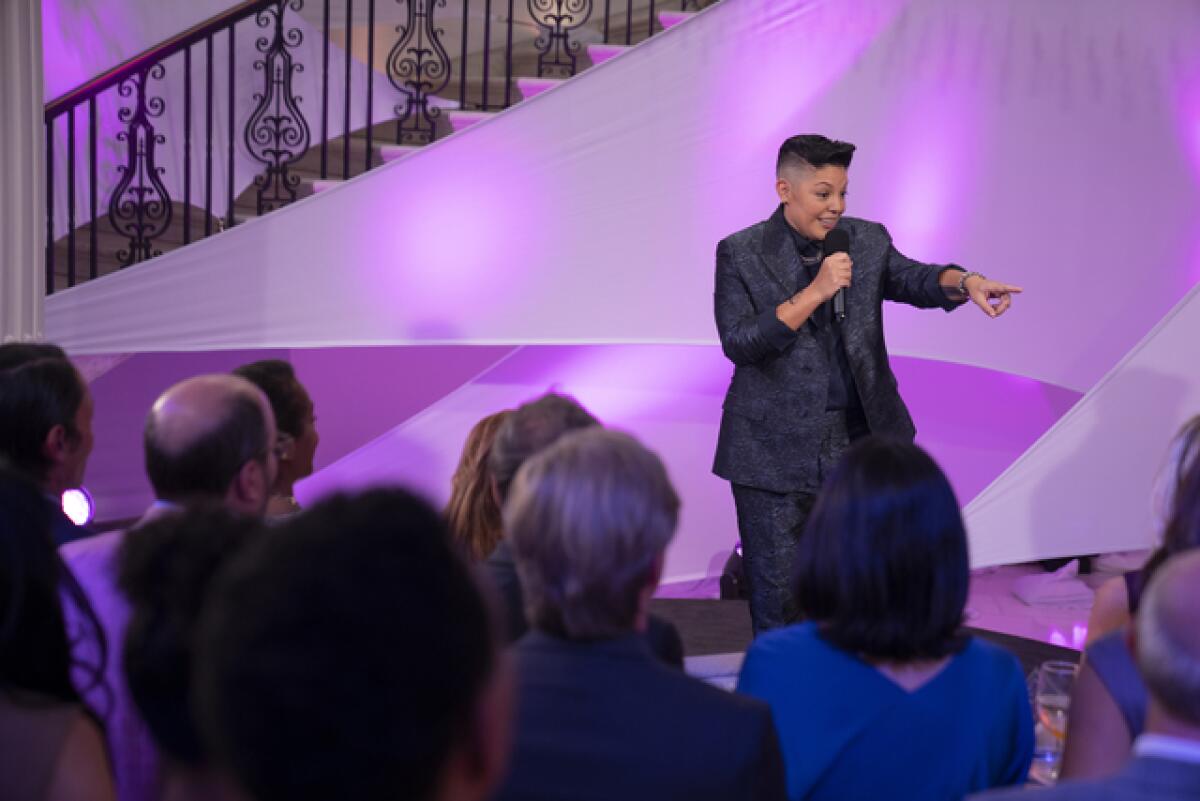
MB: Mary, that is truly terrifying to contemplate. Though as a New Yorker I feel compelled to say that it feels like this show represents my city less than it ever did, especially post-COVID, when no one in their right mind wants to wear heels. “And Just Like That” feels much less interested in New York than “Sex and the City,” which was about Carrie’s love life and her ongoing relationship with Manhattan. (It was right there in the title!) That sense of place is mostly absent here. There were times — like when Carrie moved into that white void of an apartment with the most ridiculously fake waterfront view I have ever seen — when I wasn’t even sure this show was made on Planet Earth, much less in New York.
In an attempt to atone for “Sex and the City’s” sins of omission, “And Just Like That” introduced at least four major characters of color, but these characters were largely half-baked, with storylines so flimsy it was hard to feel invested in their outcome. (Nya, you seem nice and have good style. But I simply don’t care about your marriage to whatever his name is. Also, why do you keep hanging out with Miranda? She’s your student. It’s weird.)
Meanwhile, the new character who consumed the most screen time was also by far the least likable: Che Diaz. In addition to be the worst fictional comedian in the history of fictional comedians, Che is also the kind of boss who will show up at your apartment while you’re recovering from surgery, get to third base with your best friend in the kitchen while you piss yourself in bed, then fire you with no notice because they’re going out to L.A. for a few weeks to make a pilot.
But enough about Che. By the end of the finale, Carrie has moved on to a new romance with Hot Podcast Producer. I suppose this is exciting, though I wish it had come about five episodes sooner and we could have had a show about a woman finding love after loss instead of ... whatever this was.
Mary, is there anything positive you can say about the series? I will say I liked the addition of Sarita Choudhury as Seema, though I wish we’d seen more of her. I was glad Steve was lucid long enough to give his sweet little speech about marriage and only wish that Miranda had listened to it. And that drunken sex scene in Carrie’s kitchen was, if nothing else, entertaining to watch — it had some of the outrageous spark that animated so much of the original.
The ‘Sex and the City’ reboot’s closest kin to Samantha opens up about her varied career, her no-holds-barred audition and filling some big Manolos.
MM: I did like Seema, though not that so much of the story revolved around her finding the right guy. Choudhury is always a pleasure to watch and Seema at least does not appear to have been in cold storage for the past 12 years. I liked the rabbi who shows up at the end, though not that she is continually identified as “the trans rabbi.”
But I feel like we haven’t talked about the finale as a finale, or even mentioned the excising of Chris Noth, leaving at least one flashback scene in tatters. Obviously, the main storyline of the series was Carrie getting over Big’s death, something that was, if we’re honest, far less traumatic than the fallout Peloton faced. Still, early episodes dealt effectively enough with the numbed shock of early grief, and I appreciated how, when her agent pushed back on her memoir, Carrie realized her actual life was not as marketable as her random musings on what sex and the city all meant. (Did we ever believe she was an actual columnist? Not when she spent so much time typing while lying fetchingly across her bed on her stomach.) The insistence that Carrie offer readers a glimmer of hope was, of course, also a clunky way to get her back on the dating scene, because no one is interested in a woman who is not at least seeking love.
The sexual assault accusations against Noth certainly distracted from any residual fondness/nostalgia viewers might have had for Big, which left the writers in the unfortunate position of having a final moment — Carrie scattering Big’s ashes — that no one cared about. But frankly, any pathos would have been hard to sustain once we got a look at the absurdly enormous orange dress Carrie wore to do the honors. I realize that part of Carrie’s charm is her penchant for, and ability to pull off, the most outrageously inappropriate if personally stylish clothing ever. (I’m still not over the fascinator at Big’s funeral.) But this enormous tangerine-colored situation was over the top even for her. (I’m not even going to mention the Eiffel Tower handbag in which the ashes were stashed — did she funnel them in herself in the hotel room?) I mean honestly, even in Paris this dress would have stopped traffic, and in all likelihood led to the gendarmerie informing Carrie that it is illegal to dump human cremains into the Seine. Which it is. In case you were wondering. (Between this scene and “Emily in Paris,” I believe Americans have lost all right to call the French rude.)
While it would have been hilarious to see her hauled off in handcuffs in that dress, I do feel bad for all the emotive work Parker put into the scene. But even as the camera caught her Nefertiti-inspired profile, it was all very anticlimactic. I did not feel bad, however, for my hoot of outraged laughter when suddenly Mr. Hot Podcast Producer was introduced as a last-minute please-give-us-a-second-season love interest. I mean, Jeff Zucker just stepped down for having an affair with a co-worker, for heaven’s sake. But whatever, love is love and I wish them well (Carrie and Hot Podcast Producer).
As long as they promise to stay in New York, and not follow Che and Miranda to L.A.
MB: And even if they do, I will watch every episode. God help me.
More to Read
The complete guide to home viewing
Get Screen Gab for everything about the TV shows and streaming movies everyone’s talking about.
You may occasionally receive promotional content from the Los Angeles Times.
